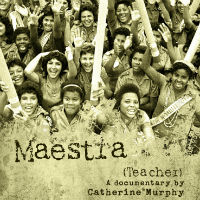Curriculum Resources

« All Topics
Maestra (2012)
Cuba, 1961: 250,000 volunteers taught 700,000 people to read and write in one year. 100,000 of the teachers were under 18 years old. Over half were women. MAESTRA explores this story through the personal testimonies of the young women who went out to teach literacy in rural communities across the island - and found themselves deeply transformed in the process.
Lesson Guides and Classroom Activities
Maestra Film Guide for Educators
Grade Levels: 9–12, College
An educator discussion guide to accompany the film MAESTRA, including a director's note, discussion questions, and additional resources.
Grade Levels: 5–8, 9–12, College
Subject Area(s): Social Studies, Spanish, History
This lesson plan pairs the documentary Maestra with a clip from the film American Experience: Fidel Castro. It highlights the importance of literacy in post-revolutionary Cuba and teaches the literacy movement as a lens through which to study turning points in Cuban history, as major shifts in policy and history affected volunteer literacy teachers. This curriculum also draws connections between literacy more broadly and political literacy/the importance of rhetoric to Fidel Castro's regime. By incorporating clips of Fidel Castro, and of volunteer teachers, this lesson plan urges students to consider literacy's role in history, politics, and culture in Cuba and beyond.
Freedom Through a Pencil: The 1961 Literacy Campaign in Cuba
Grade Levels: 9–12
Article about the Cuban Literacy Campaign of 1961. Excellent background for the film Maestra.
Lesson Plans
PDF
Cuban Literacy Project: Literacy, Language and History: Cuba 1961
Grade Levels: 5–8, 9–12, College
